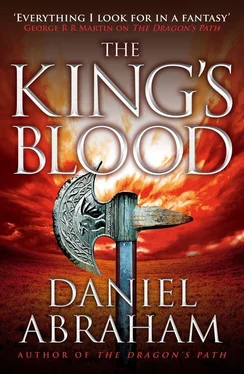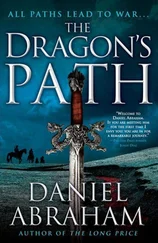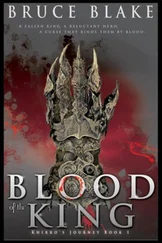“You play a dangerous game, my lord,” an unfamiliar voice behind him said.
The man was a Firstblood with pale brown hair and an open, guileless expression. He wore riding leathers and a wool cloak entirely covered in patterned embroidery that seemed understated until Geder looked at it closely, and then seemed like a boast. Geder didn’t need to be told who he was. Sir Darin Ashford was his own introduction.
“My Lord Ambassador,” Geder said.
Ashford nodded, but his gaze was set farther out. To the courtyard.
“Lord Daskellin’s girl, isn’t she? Beautiful woman. I remember when she first entered society. She was all knees and elbows back then. Amazing the difference three years will make.”
“She was here to deliver her father’s invitation,” Geder said, defensive without knowing precisely what he was defending against.
“I’m sure she was, and she won’t be the last. A baron without a baroness is a rare and precious thing, and protector of the prince carries as much prestige as a wardenship. Maybe more. You’ll have to step clever or you’ll find yourself married before you know who you’re married to.” Ashford’s smile was charming. “Is the prince here, by the way?”
“He’s not,” Geder said. “I thought it was poor form to have him too close to hand when you were here.”
Something like chagrin passed over the ambassador’s face.
“Well, that doesn’t bode well for me. It’s hard to ask for your help when you already think I’m an assassin.”
“I didn’t say that,” Geder said.
“No, you acted on it,” Ashford said. “And that, Lord Protector, very much matches your reputation. Should we retire inside?”
Geder didn’t take him back to the same room. Having the voice and face of Asterilhold in the same room where Sanna Daskellin had been felt like dirtying something Geder didn’t want soiled. Instead, they went to the private study where Feldin Maas had killed his wife Phelia and all his elaborate, clandestine plans to join Antea and Asterilhold with her. The significance was lost on Ashford, but Geder knew.
Geder sat on a wide-set chair, leaving an upholstered bench for Ashford. A servant boy brought in a carafe of watered wine and two glasses, poured one into the others, and retreated without speaking or being spoken to. Ashford sipped the wine first.
“Thank you for seeing me, Lord Palliako,” he said. “I’d have understood if you’d refused me.”
“Jorey Kalliam spoke for you.”
“Yes. I’d heard you two were friends. Served in Vanai under Alan Klin, didn’t you?”
“We did,” Geder said.
“Klin, Issandrian, Maas. The triad, and Feldin Maas the only one who didn’t get thrown out of Camnipol that summer. King Simeon sent Dawson Kalliam away instead.”
“Your point?”
Ashford looked pained and sat forward, the glass of wine cradled between his fingertips.
“King Simeon is a good man,” Ashford said. “No one doubts that. King Lechan is too. But no king can be better than his advisors. If he’d known then what he does now, Dawson Kalliam wouldn’t have been exiled and Feldin Maas wouldn’t have been let stay. Simeon needs good men to guide him. Men like you and Kalliam.”
Geder crossed his arms.
“Go on,” he said.
“His son was threatened. Go to any man, peasant or priest or high noble, hold a knife to his child’s throat, and he’ll kill you to keep his own safe. It’s nature. You saved the prince, and Simeon saw justice done when he finished Maas. But it has to stop now. Give Lechan a season—a year—to root out what parts of the conspiracy were in Asterilhold, and there’ll be justice done there too. Bring swords to the border, and a few men’s follies become a tragedy for thousands. And for no reason.”
Geder chewed absently at his thumbnail. Ashford’s sincerity was persuasive, but something bothered him. He started to speak, then stopped.
“Both our courts had rot in them,” Ashford said. “You’ve cut it out of yours. All I’m asking is the time to do the same.” “Maas wanted unification,” Geder said. “The plan was to unite the kingdoms.”
“Maas wanted power, and he made up any story he needed to justify it. If Lechan had gotten word of this, he’d have ended it in the same breath.”
Geder frowned.
“Your king didn’t know?” he asked, annoyed at his own voice for sounding so querulous. The ambassador looked directly into his eyes, his expression was sober. Solemn.
“He didn’t.”
Geder nodded, but he didn’t mean anything by it. It was only a gesture, a thing to fill the silence. If it was true and the king of Asterilhold would have acted against Maas just as much as King Simeon had, then helping to keep peace would be in everyone’s best interests. It would absolutely be the right thing to do. If, on the other hand, the ambassador was only a good actor playing his part on a series of very small stages, taking his side was collaborating against the throne. The good or ill of the kingdom—and more than that, of Aster—rested on Geder’s judgment. He frowned seriously, trying to match gravity with gravity.
The fact was, Geder didn’t know what to think. He felt he might just as well spin a coin.
“I will think on it,” he said carefully.
The long months of winter, Geder’s patronage, and a dozen lesser priests from the temple in the mountains past the Keshet had made the temple grander and more polished. Where the grit and grime of centuries had blacked the walls, the tilework glowed now. Most of the traditional religious images and icons had been taken apart and the original material reused to make different images. Most had the eightfold symmetry of the great red silk banner that fluttered over the main entrance. The air was thick with the scent of the nettle oil that burned in the lamps.
In the center of the sacred space, a half dozen priests stood in a circle, laughing and playing a game that seemed to involve pitching hard, uncooked beans into one another’s opened mouths. A half dozen priests and one prince of the realm. Aster’s pale skin and round features stood out in that company. All the priests shared long faces and wiry hair, like members of the same extended family. Their brown robes looked dusty beside Aster’s bright silks and brocade: a songbird among sparrows.
“Geder!” Aster shouted, and Geder waved. It was good to see the prince laughing. Though Aster hadn’t complained, the winter had been hard for him. Especially the weeks after the end of the King’s Hunt and the return to Camnipol for the opening of the season. This was the first time of any significance that Aster had spent away from his father, and the darkness of the holding at Ebbingbaugh had taken its toll. Geder had done what he could, but he’d never had a brother and few enough friends among his peers. They’d played cards together in the dark nights. It was the nearest thing to comfort he could offer.
Basrahip, the high priest, was in his private room. The huge man sat on a low cushion, his eyes closed in meditation. For a moment it was hard to think why the room seemed bare. It had its bed, its desk, a tall cabinet with carved rosewood and inlays of ivory and jet. The fire grate had unlit logs and tinder ready for the spark. The carpet was a deep red with a pattern of gold that seemed to undulate in the lamp’s light. But it wasn’t littered with books and scrolls. So that was the difference.
When Geder, in the doorway, cleared his throat the big man smiled.
“Prince Geder,” Basrahip said.
“Lord Palliako. I’m Lord Palliako. Or Baron Ebbing-baugh. Prince means something very particular here. It’s not like in the east.”
“Of course, of course,” Basrahip said. “My apologies.”
Читать дальше










